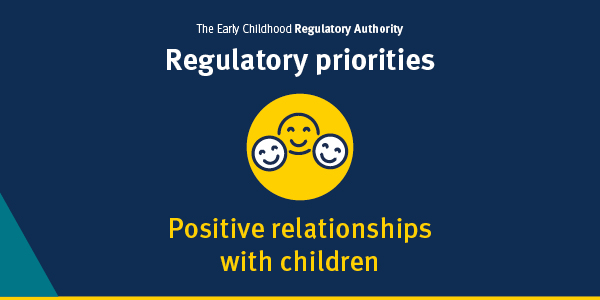The role of an early childhood educator in creating positive relationships with children is complex. Educators must balance nurturing individual needs with fostering group dynamics, all while being responsive to children’s diverse backgrounds and personalities. It’s important for educators to build trust and create an emotionally safe environment where every child feels valued. This involves not just offering consistent support and encouragement, but also modelling positive behaviour and effective communication.
Positive relationships with children is a regulatory priority

We are continuing to see the ongoing impacts of the COVID-19 pandemic on the early childhood education and care sector, primarily through:
- workforce shortages
- heightened behaviours in children.
Both these issues can result in situations where educators are stretched thin, potentially leading to reduced individualised attention and challenges in effectively addressing each child's emotional and behavioural needs. Consequently, breaches of the Education and Care Services National Law (National Law) and Education and Care Services National Regulations (National Regulations) can occur.
By placing a spotlight on these issues, the Early Childhood Regulatory Authority hopes to support educators and service leaders with information, training and strategies to foster positive relationships with children, even under challenging conditions.
Did you know:
- The National Law
section 166 offence to use inappropriate discipline is consistently one of the most commonly breached provisions of the National Law, as indicated by
recent years' data.
- National Regulations require positive relationships with children
-
Regulation 155 requires providers to ensure that educators engage with children in positive ways that encourage children to express themselves and feel emotionally and culturally safe.
-
Regulation 156 requires that educators create opportunities for children to develop respectful and positive relationships in group settings with other children and with staff.
Considerations for creating positive relationships with children
Everyone has a role to play in ensuring positive relationships with children.
Service leaders
Approved providers must ensure that education and care support positive interactions underpinned by inclusive programs, positive guidance and encouragement, and support for children to develop self-reliance and confidence (regulation 155).
Approved providers, nominated supervisors and family day care educators must ensure that no child is subjected to any form of corporal punishment or any discipline that is inappropriate in the circumstances (section 166).
Approved providers must support their staff to:
- interact positively and respectfully with children
- provide a quality program that meets each child's interests and needs
- develop and follow policies and procedures that guide positive behaviour and ensure a child-safe environment
- follow a clear structure for reporting and addressing any instances of inappropriate discipline or inappropriate interactions.
Educators
Educators must navigate the delicate interplay between providing structure and allowing for autonomy, guiding children in social interactions while respecting their individual differences. They need to be attuned to the emotional and developmental needs of each child, adjusting their approaches as those needs evolve. Through this nuanced and dynamic approach, early childhood educators lay the groundwork for positive self-esteem, resilience, and a lifelong love of learning in the children they work with.
Educators who give priority to nurturing relationships and providing children with consistent emotional support can assist children to develop the skills and understandings they need to interact positively with others. They also help children to learn about their responsibilities to others, appreciate their connectedness and interdependence as learners, and value collaboration and team work.
Young children are still learning how to socialise appropriately with others and how to manage feelings and behaviours.
Educators can guide and encourage children to develop self-regulation skills and to interact effectively with others by:
- role modelling and managing their emotions so responses to any behavioural concerns are constructive, positive and appropriate
- responding promptly to any behavioural concerns and acknowledging children's positive choices in guiding their behaviour
- consulting families and other support people for valuable information and insights about each child's strengths, interests and needs, and strategies for participating in the education program.
Links and resources
Training
Eligible educators and services can access free training to enhance their skills in
positive behaviour guidance and
protective behaviours. Find out more on our
early childhood guidance program pilot page.
For educators
'Children are full of emotions and it can cause challenging behaviour. But it's important to recognise that they are children. They haven't mastered their emotions like we have. So, we have to role model to them.'
See the
show, not tell: guiding behaviour page for more information. Watch the video below.